Can sweaty baby feet or a child that sweats a lot, in general, be a sign of illness?
Let’s go through normal and abnormal sweating in children, possible causes, what parents should do about it, and frequently asked questions about children’s sweating.
The information in this article is provided by Pediatrician Leah Alexander. The purpose is to provide examples and knowledge to help parents dig deeper into their baby’s situation, not to offer a complete picture or a possible diagnosis.
Mom’s Question:
My baby has very sweaty feet. I find it so strange and wonder if something is seriously wrong.
Please help.
Anna
Why Does My Child Sweat So Much? Should I Worry?
In this article:
Why do we sweat?
Sweating is how the body itself cools to keep its temperature as close as possible to a normal 98.6 degrees F (37 C). Water and salt are the primary components of sweat, and it is produced by specialized glands within the skin. There are three types of these glands: eccrine, apocrine, and apoeccrine.
When an infant or child sweats, most of it is released from the eccrine glands located all over the body. The palms of the hands and soles of the feet have clusters of this sweat gland type. In contrast, the apocrine sweat glands are paired with hair follicles on the face, head, groin, and under the arms.
Although present at birth, they are not fully functional until puberty. While some amount of sweat production is normal, some parents may feel that their infant or child sweats excessively. There are various reasons why this may occur, including some that indicate a medical problem.
Normal Sweating
“Feeling Hot”
It is normal for infants and children to sweat when they have become overheated. Spending time outdoors on a hot day or inside of a very warm home can cause sweating. Physical activity, even in normal ambient temperatures, can trigger the release of sweat to cool down the body. Flushed cheeks can develop in both infants and children. The hands and feet of infants may also appear very red. This is due to increased blood flow in these areas to release body heat.
Sometimes, a baby is simply dressed too warmly, causing him or her to sweat. This is common as many parents and caregivers believe babies easily become cold. In reality, except for newborns, premature infants, or the presence of an underlying medical condition, most infants tolerate ambient temperatures that are comfortable for adults.
Signs of “too many layers” are sweat-soaked hair, damp clothing, and an overall feeling of skin wetness. In addition to sweating, infants may develop red pimples on the chest, abdomen, or back when they become overheated. This is called a “heat rash” and resolves within a day or two once efforts are made to keep the skin cool.
If you don’t have one, get a simple air thermometer and put it in the stroller to check the temperature.
Sweating due to a fever
Common illnesses such as upper respiratory, ear, and other infections are often associated with a fever. Infants and toddlers may also experience fevers following immunizations or even when teething. Any temperature above 100.4 degrees F (38 C) is considered a true fever.
Because the body temperature is elevated, sweat glands increase sweat production to return the core body temperature back to baseline. In most cases, there are other symptoms. If the reason for a fever is not obvious, or the infant is under the age of three months, medical attention is warranted.
Feeling Upset
Sweating may occur during vigorous episodes of crying, which causes more energy expenditure than many parents realize. A toddler who screams and cries during a tantrum may be “soaking wet” with perspiration by the time it has ended.
Abnormal Sweating
Primary Hyperhidrosis
Some children and adolescents experience a condition of excessive sweating called hyperhidrosis. The primary type is associated with acute episodes of heavy perspiration with no specific trigger. Recent research has shown that there may be a genetic predisposition.
This condition typically affects children and adolescents, and they frequently experience sweaty hands, feet, or underarm areas. These kids often avoid wearing light-colored shirts or holding hands due to feeling self-conscious about sweating.
This video explains hyperhidrosis, including treatment.
Secondary Hyperhidrosis
Secondary hyperhidrosis is sweating due to a medical condition.
An over-functioning thyroid gland can cause excessive sweating. This condition is seen in newborns of mothers who have an overactive thyroid, although it typically self-resolves after a few weeks of life. In children, hyperthyroidism is associated with weight loss, hand tremors, and poor school performance.
Infants born with a congenital heart defect may frequently sweat due to their hearts needing to work very hard to pump blood throughout the body. These babies may have a heart murmur, a bluish tinge to the skin, or require a high-calorie infant formula or breastmilk fortifier to gain weight.
Sleep apnea and restlessness can be associated with night-time sweating. These children typically snore and move around the bed while sleeping.
In addition, some types of cancer can cause night-time sweating.
What Parents Should Do
For the majority of the “normal” causes of sweating, it is important to take steps to cool the infant or child. This may include moving to an air-conditioned room, giving a lukewarm bath, and removing layers of clothing. Offering fluids helps to both cool the body and provide hydration. If, despite these measures, your baby or child seems lethargic, has arm or leg pains, or has difficulty breathing, emergency medical attention is necessary.
When a fever is the cause of sweating, lukewarm baths and cool fluids can also provide relief. Fever reducers such as acetaminophen or ibuprofen (over age six months) are effective. If the fever lasts more than three to five days or does not respond to attempts to lower it, parents should consult a doctor.
Primary hyperhidrosis does not require treatment unless it is particularly bothersome to the child or impairs social interactions. However, prescription antiperspirants can be effective in reducing the amount of axillary sweating in older children and adolescents.
Botox is an effective treatment that has gained popularity over the past few years. Such injections are administered locally in the areas of concern every three to nine months. For all etiologies of secondary hyperhidrosis, the underlying medical condition must be addressed. Depending on the condition, the amount of sweating should decrease once it is treated.
6 Frequently Asked Questions on Sweating In Babies
My child sweats while asleep. Should I worry?
The most common reason that a child sweats is that he or she has become overheated. A sheet, blanket, quilt or comforter, long-sleeved and long-pant pajamas, is probably too many layers. In other cases, the child’s room may be too warm. When air conditioning is not possible, a bedtime bath or shower can at least help them begin the night feeling cooler.
Except for blade-free versions, fans can be a safety hazard and are ineffective in weather conditions above 90 degrees F (32 C).
My baby sweats while breastfeeding. Why?
The most likely reason that infants sweat while breastfeeding is due to the mother’s body heat. Breastfeeding involves skin-to-skin contact, so babies receive this warmth. This is one of the reasons that the World Health Organization recommends delaying the first bath after birth. In addition, most moms wrap the baby in a blanket while breastfeeding and may use a second one as a privacy cover. Both of these measures create more heat for the baby and may result in sweating.
Why don’t newborn babies sweat? What about preemies?
Premature and newborn infants cannot yet maintain a steady, normal body temperature. They are at risk of becoming hypothermic, having a low body temperature, or becoming too cold. These infants lose body heat due to wet amniotic fluid on the skin and a cooler environmental temperature than what they experienced in utero. For this reason, some premature infants are kept in incubators with higher ambient temperatures than in the neonatal intensive care unit.
The World Health Organization recommends postponing the first infant bath until the second day of life, giving newborns time to develop the ability to thermoregulate.
What is the connection between sweaty baby feet and SIDS?
Overheating is one of several factors that increase the risk of sudden infant death syndrome. If you notice sweaty hands and feet on your baby, chances are that he or she is too warm. A lightweight onesie and lowering the thermostat can prevent this issue.
Why is my baby sweating but has no fever?
Any of the reasons discussed above could cause your baby to sweat. If he or she shows signs of illness, sweating is how the body attempts to keep its temperature as close as possible to a normal range.
My child is sweating, but is it cold to the touch?
In most cases, cold skin while sweating is a good sign. It means that the sweat is “doing its job,” cooling down the body. However, there is a rare condition called cold-induced sweating syndrome. In this scenario, the infant or child sweats even when feeling cold.
This disorder is associated with other concerning symptoms such as facial and limb deformities, poor feeding, and a persistent scaly skin rash. Because of these characteristic features, the diagnosis is typically made during the first few weeks of life.
Takeaway
Sweaty baby feet, or other excessive sweating, can, as you’ve read now, be a sign of illness, such as hyperhidrosis, with or without underlying causes. However, in most cases, the sweating is due to normal reasons, including the child being overdressed, upset, or having a fever.
A rule of thumb (as always) is to talk to your baby’s pediatrician if your child’s sweating seems weird and unrelated to being overdressed or very active. And especially if your baby doesn’t seem to thrive in other ways too.
Good luck!
References
- MayoClinic about hyperhidrosis.
- Baker LB. Physiology of sweat gland function: The roles of sweating and sweat composition in human health. Temperature (Austin). 2019 Jul 17;6(3):211-259. doi: 10.1080/23328940.2019.1632145. PMID: 31608304; PMCID: PMC6773238.
- Newborn Thermoregulation
- Hyperthyroidism
- Sweating in Infants and Babies
- Cold-induced sweating syndrome
- Signs and Symptoms of Childhood Cancer: A Guide for Early Recognition
Find comments below.

Paula Dennholt founded Easy Baby Life in 2006 and has been a passionate parenting and pregnancy writer since then. Her parenting approach and writing are based on studies in cognitive-behavioral models and therapy for children and her experience as a mother and stepmother. Life as a parent has convinced her of how crucial it is to put relationships before rules. She strongly believes in positive parenting and a science-based approach.
Paula cooperates with a team of pediatricians who assist in reviewing and writing articles.

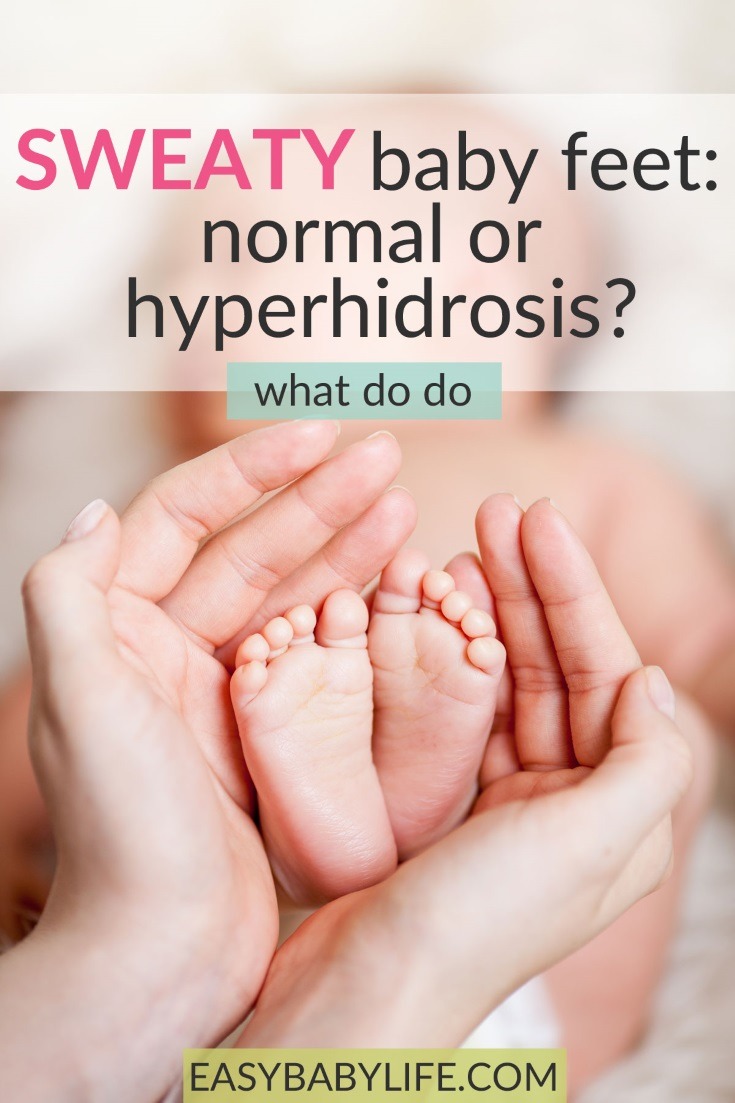
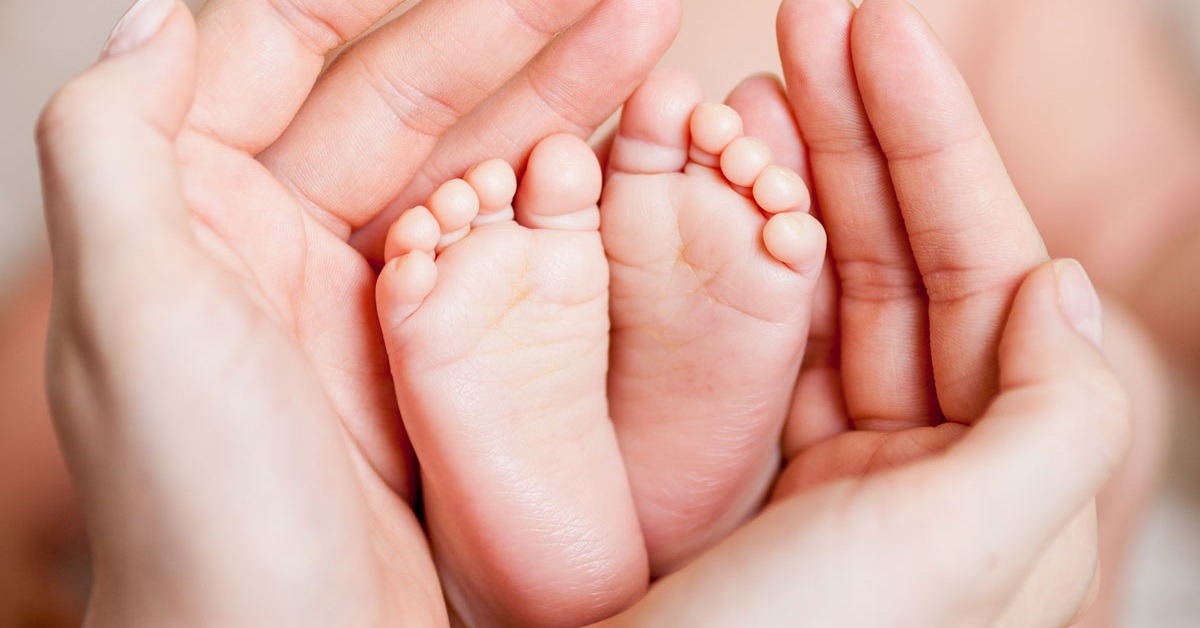
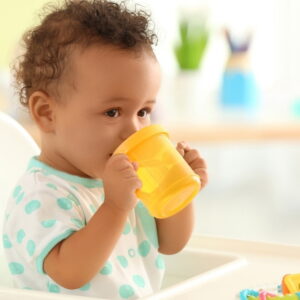
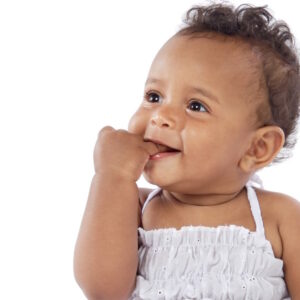
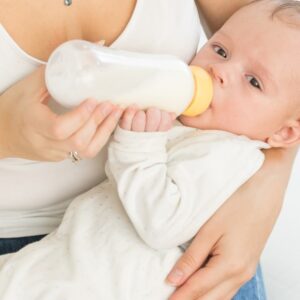
Hello everyone, I have got a 4 months daughter. She has a very wet feet and very wet hands, palm, and also she is underweight as well can any one tell me please what is wrong with her?
My 4 month old daughters feet sweat only when they are cold and it is a lot. I can see dropletts of i. When they are warm not a drop of sweat. Can anyone suggest anything or give me any advice?
Perfuse sweating in your baby may be a sign of a heart condition. At 4 months of age, my youngest daughter would sweat perfusely when she cried and when she slept. I would literally have to change her clothes because they would be sopping wet.During a routine exam, her pediatrician discovered a murmur. We were referred to a pediatric cardiologist and it was discovered that she had hypertrophic cardiomyopathy or HCM.HCM comes in many forms but in her case, her heart was too thick, which put her at increased risk for arrythmias which can be lethal. This is the same heart condition that causes people in competitive sports to just drop dead.She was placed on atenolol until she was 3 1/2. She’s fine now and hasn’t had any problems and we visit our cardiologist once a year. She still sweats in her sleep but is healthy for the most part.
My daughter is 4 years old and still has really sweaty hands and feet. I hope this is not a health concern!! I will ask at her next doctors visit.
I am relly very worried about my babies sweaty palm and feet. She inherit this character from me,and I have hyperhydrosis. After sweating her palm and feet turns very cold and sometimes afterthat she sneez. I feel very guilty for this.
My baby sweats from her feet even if she’s just in a nappy. She’s is 5 months old now and it has always happened. She sweat so much that when she kicks me my trouser gets wet patches in them. Is it normal even though she’s just in a nappy.
My sweet lovely daughter has sweaty feet and l began noticing that when she made 2months cos she is making 3 next week.l was planning to meet her doctor one of these days but l am a bit relieved now that all these comments have helped me know it could be something normal. Although l will go ahead and plan to meet her doctor.l rarely get worried and this helps me to think through things en so l encourage mothers to try this habit cos we may cause more harm esp with our lovely babies who cant explain where en how they are hurting.
I have a baby who sweat excessively (esp when he is at sleep) during his early months and until now that he is almost 3 years old. he is normal and grow very healthy. I never noticed a problem in his health. Maybe this is because his father, my husband, sweat excessively too from his childhood until now that he is 30. maybe this is normal because the doctor found no fault on his health.
Good to know that im not alone, my three old months boy also gets sweaty feet and hands but not all the time, so i try and underdress him, however he is also very active by kicking and waving his hands, this could be the reason. He is due for a doctor’s appt. so i intend to mention it. i hope its nothing.
Hi, my son is 15months old and has really warm hands and feet but goosebumps all over his body where he is cold wat is the problem thanks
my eldest child who is 10 years has this problem for the past 3 years and my son who is 3 months old has sweety hands and feet now itself. when asked my doctor said not to worry and there are many doctors too who have sweety hands so hope that its not such a big problem and we all should stop worring……….
that operation ets may sound small and non invasive but there are many side effects , please research it as much as possible and get a few different opinions from different doctors. playing with the delicate nervous system by burning and clamping is a very scary as the nervous system controls the whole body. please research it carefully.
I have a 4-month-old boy, since birth we’ve noticed this problem. my mother in law says its a pain in the butt since her oldest son had the same problem . she says there is a very small op that will cure this problem. so next time I visit the dr. I will bring it up. my son is constantly sweating from his hands n feet, n are very cold…only wen out the bath his feet r back to normal
My 7 month old son also has very sweaty feet and googled it so see what I could find out. Seems as though it is a common thing as long as your baby is thriving. I feel much better after reading all the comments…lots of sweaty baby feet out there!
feel so much better knowing other people have sweaty babies too! It’s strange cos my 5 yr old boy never had this problem, after reading another ladies problem a few spaces above mine, maybe it is more common in girls?? My daughter is 4 month n her feet seem cold but are wet, sometimes on her hands too, hope she grows out of it!!
My 15 weeks old little girl is the same, her feet and hands are cold and sweaty, she is never overdressed though, yest her feet were so wet they had looked like she had been in the bath as they had gone all crinkly!!, am glad to see that others have the same problem xx
Hello all my 16 week old baby has wet feet when she is warm ..as did my other daughter who is now a beautiful healthy 11 year old on her way to high school in Sep (less the wet feet) , Its funny as i had two boys inbetween the girls and they didn’t get wet feet , i wouldnt worry just one of them things ….enjoy your babies happy days :)
I have a nine month old and the sweaty feet only started occurring in the last month. It stops her being able to sofa cruise on our wooden floor as she slips over. Her feet are so wet, they are dripping. I have had to buy grippy socks for her to wear around the house. We went to the Doctor and he mentioned Cystic Fibrosis as this can cause excessive sweating but most babies have the heel prick test for this and she has no other markers for it such as not gaining any weight etc. I think it is just one of those things with the developing sweat glands and I hope she’ll grow out of it for her. It was good to read here that so many others have it, which signals to me that it is quite normal.
Sweaty feet might appear when there is not enough vitamin D and/or calcium.
This is interesting and I’ve spent well over an hour trying to verify what you say. A lot of web pages do claim a link between excessive sweating and D-vitamin deficiency and even rickets, but I have yet to find the underlying research. When and if I find it, I’ll certainly post a link for you!
My granddaughter has had sweaty feet and hands since birth. We have told three doctors now and no one seems to think it important. I am concerned because there is serious heart problems in my family. And my granddaughter while in the womb had distress issues. should i pressure the doctors to look closer?
My daughter has the same thing but she seems fine and is very healthy. I also sweat quite a bit in my underarms, but I use odaban which works wonders and I hardly sweat now at all. Obviously, I wouldn’t suggest you use this on a child, but when they get older i.e., teenagers and its embarrassing then odaban could be an option.
Glad to see this, I also follow the “one more than you” rule, and my little one has sweaty hands and feet; this just kicked in this week, she is 11 weeks old.
I also have a baby who is 3 months and has very sweaty feet, although it isn’t constant. I notice that they get very sweaty about once a day. I was so relieved that there is so many babies out with the same problem. I will also have it checked on his 4-month check-up!
We are going through the same thing with our 44-month-old. The doctor wants to see her this afternoon. She is also not dressed warmly just a t-shrit and no socks and still glistening feet. So we will see. I think it will be nothing also, but better safe than sorry.
My six month old son has sweaty feet and hands, but his feet are worse.
I feel so happy reading all the comments posted on this page as I’m not all alone, as I was really worried.
Yes,
My babies feet and hands are always sweaty, especially the feet. I feel a bit better seeing all these comments but will ask about it on his 4 month check up.
I have hyperhidrosis. I had an operation when I was 14 to stop it in my hands as my mum picked it up straight away. Yes I, still sweat excessively, more than other people, but I wouldn’t go as far to say it is a life half lived??!!My 3-month-old sweats from his hands and feet now too, but I’m not worried, and neither should anyone else be, aside from adapting (ie not wearing certain fabrics in certain shades on a hot day!).I have never let it rule my life. This operation was done 17 years ago, by the way, so advancements are here now. Babies sweat to cool down, people sweat to cool down, be thankful it is not something serious, and honey, if you truly feel that your life has been half-lived with hyperhidrosis, please do something about it! It is sweat, that’s all. xx
I suffer from hyperhidrosis (excessive sweating of the hands and feet) and I am concerned because my baby’s hands sometimes feel a little wet and I am worried that my bubba has inherited this condition from me. I really hope not because a life with hyperhidrosis is a life half lived.At least I know what this is so I can start treatment as soon as possible; my parents just ignored my condition and never talked about it so I had to work it out for myself.
My 6-month-old daughter has this issue and I’m concerned as well no she’s not overheated because her temp will be fine and she’ll have a tank top onesie on, but her feet will be soaked and ice cold. It’s so strange! Has anyone found an answer to this yet?
Have a 15-week old little boy, he has sweaty hands and feet too, but I won’t worry too much as there are quite a number of children with this, so hopefully, they will all grow out of it, I really hope so.
Hi, my 3 months old baby boy very often has sweaty hands and feet. I don’t think it’s due to overdressing tho. I still follow the ‘one more layer than I’ method. Oh yeah, they are actually cold and sweaty.
My four-month old has experienced the same sweaty feet, and when she does, I take this as a cue that she is overdressed.
As parents and grandparents we often, for whatever reason, feel the need to overdress our little ones. Fleece sleepers are not necessary if your home is heated to a reasonable temperature (68-70F). Once babies are able to regulate their body temperature after the first few months of life, we should dress them similarly to ourselves.
If you are too warm, chances are your baby is too warm too, hence the drippy feet.
I have a 10 month old whose feet are always
wet and sweaty. I have been trying to get information on it because I
am not sure if it is a medical problem or not. The doctor said not to
worry, but you actually see beads of sweat on his feet. It does not
seem normal to me. Has anyone seen this before?
Thanx. I also have a 3 month old baby girl who also has very wet feet. She is active and no problem with weight.
I have a 3 month old baby girl and her feet
are just so sweaty all the time? I was wondering if this was normal. I
think it may be just a way her body gets rid of the heat? You are not
alone.
I recommend changing socks more often.
Also bathing more.
Specially socks over night.
And more tummy TIME.
Making shure baby eats fruit and veggies as snack between…wishing the best relationship between mummys and babys.